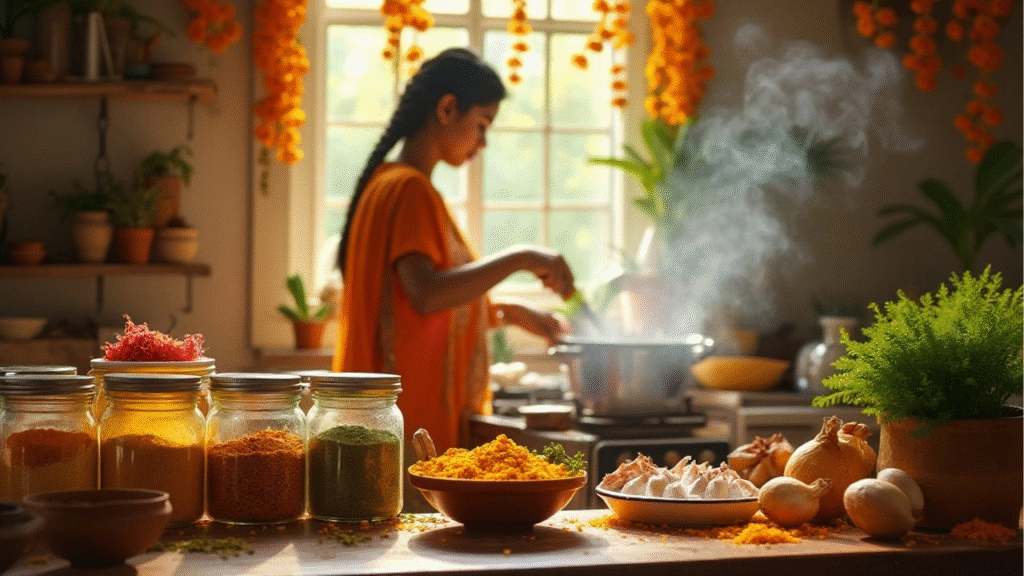Indian cooking is rich in flavor, aroma, and tradition—but when living abroad, especially in Western countries like the United States, the very same spices and sizzling tadkas (tempering) can often spark complaints from neighbors or trigger overly sensitive fire alarms.
So, how do Indians abroad manage this delicate balance between keeping their culinary heritage alive and respecting apartment living rules? Let’s explore the challenges and the practical ways the Indian diaspora handles cooking odor complaints and fire alarm issues—without sacrificing taste.
In this Article
Why Indian Cooking Raises Concerns Abroad
1. Aromatic Spices
Cumin, mustard seeds, asafoetida (hing), garlic, onions, and garam masala are cornerstones of Indian cuisine. While deeply loved within the community, these can linger in hallways or shared spaces, unfamiliar or even unpleasant to neighbors not used to these aromas.
2. Apartment Design in the USA
Many American apartments aren’t built with high-powered exhaust systems. Kitchen hoods often recycle air rather than vent it out, causing spices and smoke to accumulate indoors and drift into common hallways.
3. Overly Sensitive Fire Alarms
Unlike Indian homes, most U.S. apartments have highly sensitive fire detectors installed close to the kitchen. A few seconds of heated oil or smoke from tadka can easily set them off—bringing unwanted attention or even emergency responders.
Check Out: How to Set Up a Pooja Room in a US Apartment Without Breaking Any Rules
How Indians Abroad Handle Cooking Odor Complaints: Real Solutions That Work
Indians living abroad have adopted smart and respectful ways to continue cooking their favorite meals without disturbing the peace. Here’s how they do it:
1. Using Air Purifiers with Activated Carbon Filters
These filters absorb odors at a molecular level. Many Indian homes abroad now include a compact but powerful air purifier near the kitchen, especially in smaller apartments.
2. Installing Window Fans or External Venting Systems
In condos or single-family homes, some invest in better ventilation setups. Even a basic window fan that pulls air outside can significantly reduce lingering smells.
3. Prepping Ahead for Less Smoke
Instead of adding spices directly to hot oil in open pans, many now toast spices in the oven or use low-smoke oils like avocado or peanut oil, which produce less vapors during cooking.
4. Tadkas with a Lid On
By quickly covering the pan with a lid after adding spices, the release of strong aromas into the air is minimized. It’s a small trick that goes a long way in reducing intensity.
5. Scent Control Post-Cooking
Burning incense, lighting scented candles, or simmering cinnamon and citrus peels in water after meals helps freshen up the indoor air and avoid hallway complaints.
Check Out: Indian Passport Expired in the USA? Powerful Tips to Avoid Legal & Travel Issues
Managing Fire Alarm Sensitivity While Cooking Indian Food
1. Turn On Exhaust Fan Before Cooking
Start your kitchen exhaust fan at least 5 minutes before you begin. This primes air circulation and prevents buildup.
2. Open Windows and Use Cross-Ventilation
Create an air path that directs steam and smoke outward. Many Indians strategically open balcony doors and windows while cooking.
3. Use a Portable Stove or Air Fryer Outside
In some cases, when preparing very smoky dishes like bhindi fry or tandoori, people prefer using air fryers or induction cooktops on patios or balconies (if permitted).
4. Cover or Temporarily Disable Alarm (If Allowed)
While this must be done cautiously, some residents place a shower cap or plastic wrap over the detector temporarily and remove it right after cooking. This is only advisable in non-public areas and when fire risk is minimal.
Note: Never remove or disable smoke alarms permanently—it’s a safety hazard and against lease agreements.
Check Out: Experts Say This Health Insurance Mistake Could Cost Indian Parents Thousands in the USA
Dealing with Complaints: A Respectful Approach
If you receive a complaint from a neighbor or property manager:
- Acknowledge and respond politely.
- Explain the cultural context and assure them that you’re actively taking steps.
- Offer to discuss further or invite them to try your food—it helps bridge gaps and build community understanding.
The question of how do Indians abroad handle cooking odor complaints highlights more than just kitchen challenges—it’s about adapting culture respectfully while staying true to one’s roots. From better ventilation to creative cooking methods, the Indian diaspora has found numerous ways to continue enjoying traditional meals abroad without breaking apartment rules or setting off alarms.
So, if you’re an Indian living in the U.S. or anywhere else in the world, don’t let fear of complaints stop you from enjoying your favorite dishes—just cook smart, stay courteous, and embrace the spice of life.

